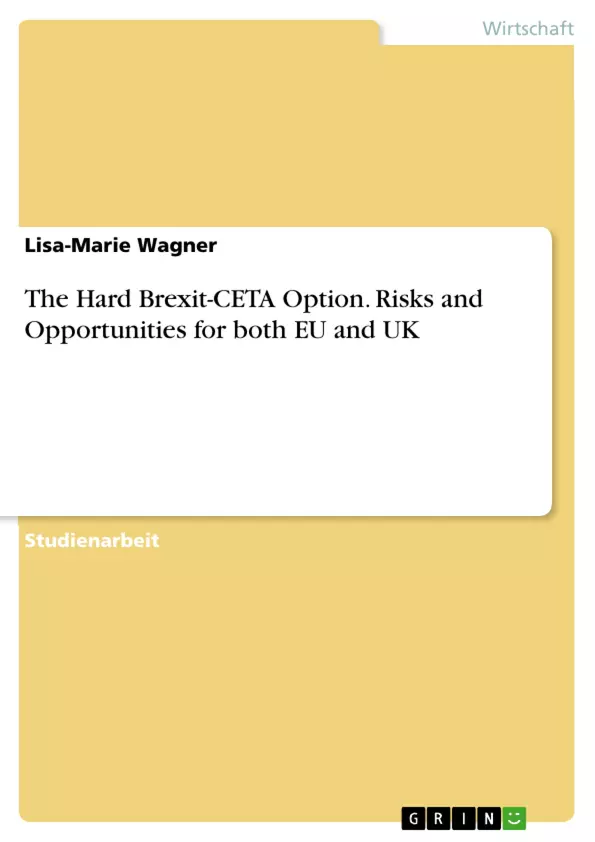The decision on the Brexit has triggered an unprecedented process in European integration: differentiated disintegration, the selective reduction of the level and scope of integration of a member state. The extent to which European integration is influenced by this phenomenon is discussed in more detail in this paper. Also, the effect of a free trade agreement similar to the CETA, as a solution for Brexit and to counter political separatism. In addition to free trade and the abolition of customs duties, this solution also has negative consequences, provided that no concessions are made to the UK, especially in the area of services. These would have to be taken in order to respect the different economic structure of the UK compared to Canada. The traditional CETA would therefore have to be modified for the UK, which makes a CETA+ quite conceivable. Whether and to what extent Brussels will make concessions to the UK will have to be observed in the future.
Already in January 2013 the British Prime Minister David Cameron has promised to renegotiate the European integration of the United Kingdom in a referendum. On 23 June 2016 it was followed by what many, not even the Brexit supporters, had seriously reckoned: In a referendum, 51.9% of the members voted in favour of leaving the EU. This triggered an unprecedented process in the history of European integration - differentiated disintegration. The day after the election, Europe was in turmoil,
as can be seen from the following statements: Donald Tusk, President of the European Council, spoke of a "historic moment, but certainly not the time for hysterical reactions". Federal Chancellor Angela Merkel explained the result not only as a "cut
for Europe", but also as a "cut for the European unification process".
Inhaltsverzeichnis
- Abstract
- 1. Introduction
- 2. Objective target and structure of this paper.
- 3. The Comprehensive Economic and Trade Agreement (CETA).
- 4. Applying the CETA model to Great Britain and Northern Ireland...
- 4.1 Risk and Opportunities for EU and UK businesses.
- 4.2 Effects on the EU and UK economy..
- 5. Disintegration of the UK from the European Union
- 6. Conclusion and current status of negotiations.....
Zielsetzung und Themenschwerpunkte
Diese Arbeit befasst sich mit der beispiellosen Herausforderung des Brexit und seinen Auswirkungen auf die europäische Integration. Sie untersucht die Möglichkeit eines Freihandelsabkommens, ähnlich dem CETA, als potenzielle Lösung für die Trennung Großbritanniens von der Europäischen Union. Die Arbeit analysiert die Risiken und Chancen, die sich für Unternehmen in der EU und im Vereinigten Königreich ergeben könnten, sowie die möglichen Auswirkungen auf die Volkswirtschaften beider Seiten.
- Die Folgen des Brexit für die europäische Integration
- Das CETA-Modell als mögliches Vorbild für ein Freihandelsabkommen zwischen der EU und dem Vereinigten Königreich
- Die Risiken und Chancen für Unternehmen in der EU und im Vereinigten Königreich
- Die potenziellen Auswirkungen auf die Volkswirtschaften der EU und des Vereinigten Königreichs
- Die Bedeutung von Anpassungen am CETA-Modell für die spezifischen Anforderungen des Vereinigten Königreichs
Zusammenfassung der Kapitel
- Kapitel 1: Introduction: Dieses Kapitel führt in das Thema des Brexit ein und erläutert die Bedeutung des Themas im Kontext der europäischen Integration. Es werden die zentralen Fragestellungen der Arbeit definiert.
- Kapitel 2: Objective target and structure of this paper: Hier wird die Zielsetzung der Arbeit dargelegt und die Struktur des Textes erläutert. Es wird aufgezeigt, welche Bereiche und Aspekte im Detail behandelt werden.
- Kapitel 3: The Comprehensive Economic and Trade Agreement (CETA): In diesem Kapitel wird das CETA-Abkommen zwischen der EU und Kanada vorgestellt und analysiert. Es werden die wesentlichen Inhalte des Abkommens und seine potenziellen Auswirkungen auf die Beziehungen zwischen den Vertragspartnern beleuchtet.
- Kapitel 4: Applying the CETA model to Great Britain and Northern Ireland...: Dieses Kapitel befasst sich mit der Übertragbarkeit des CETA-Modells auf die Beziehung zwischen der EU und dem Vereinigten Königreich. Es werden die Risiken und Chancen für Unternehmen in der EU und im Vereinigten Königreich untersucht, sowie die potenziellen Auswirkungen auf die Volkswirtschaften beider Seiten.
- Kapitel 5: Disintegration of the UK from the European Union: Dieser Abschnitt analysiert die Herausforderungen, die sich aus der Trennung des Vereinigten Königreichs von der Europäischen Union ergeben. Es werden die Auswirkungen auf die politische, wirtschaftliche und soziale Integration innerhalb Europas beleuchtet.
Schlüsselwörter
Brexit, europäische Integration, Freihandelsabkommen, CETA, EU, Vereinigtes Königreich, Wirtschaft, Unternehmen, Risiken, Chancen, Auswirkungen, Volkswirtschaften, Verhandlungen, Dienstleistungen, Anpassungen.
Häufig gestellte Fragen
Was bedeutet die „Hard Brexit-CETA Option“?
Es handelt sich um ein Szenario, bei dem das Vereinigte Königreich die EU verlässt und die künftigen Handelsbeziehungen auf einem Freihandelsabkommen basieren, das dem CETA-Vertrag zwischen der EU und Kanada ähnelt.
Was ist der Unterschied zwischen CETA und einem potenziellen CETA+?
Ein CETA+ würde Anpassungen beinhalten, die über das Standard-Kanada-Abkommen hinausgehen, insbesondere um die starke Dienstleistungsorientierung der britischen Wirtschaft zu berücksichtigen.
Welche Risiken birgt ein Hard Brexit für Unternehmen?
Zu den Hauptrisiken gehören neue Zollschranken, regulatorische Hürden und der Verlust des passiven Marktzugangs für Dienstleistungen, was die Lieferketten und Kostenstrukturen belastet.
Was versteht man unter „differenzierter Desintegration“?
Dieser Begriff beschreibt den beispiellosen Prozess, bei dem ein Mitgliedstaat selektiv den Umfang und die Tiefe seiner Integration in die Europäische Union reduziert.
Könnte ein CETA-Modell den politischen Separatismus stoppen?
Die Arbeit diskutiert, ob ein solches Abkommen als pragmatische Lösung dienen kann, um wirtschaftliche Schäden zu minimieren, während die politische Eigenständigkeit gewahrt bleibt.
- Citar trabajo
- Lisa-Marie Wagner (Autor), 2019, The Hard Brexit-CETA Option. Risks and Opportunities for both EU and UK, Múnich, GRIN Verlag, https://www.grin.com/document/958042



